Films from the country "iran", sorted by revenue

Les Enfants du Pétrole (2001)
, 1h30Directed by Ebrahim Forouzesh
Origin Iran
Genres Drama
Au début des années 1960 dans le sud de l'Iran, où sont situés les principaux puits de pétrole du pays, une famille, dont le père est parti travailler au Koweït, tente de survivre. Ismaël, le fils, aide sa mère à subvenir à leurs besoins. Jusqu'où est-il prêt à aller pour secourir ses proches ?

A Time for Drunken Horses (2000)
, 1h20Directed by Bahman Ghobadi
Origin Iran
Genres Drama, War
An Iranian Kurdish family is trying to survive after the death of its parents. Ayoub, the eldest boy in the family, becomes the head of the household and must do whatever work available to survive. Madi, Ayoub's handicapped brother, is in need of a medical operation. Ayoub goes to great lengths to collect money for the operation by smuggling truck tires with a group of Kurdish villagers near the Iran-Iraq border. Ayoub ultimately falls short of his intended goal and his uncle decides to marry off his sister in return for the groom's family financing Madi's operation on the Iraqi side of the border. When they arrive the mother of the groom refuses to accept Madi and agrees to give Ayoub and his uncle a mule as compensation. Ayoub decides to take the mule to Iraq where it is worth more, and sell it to pay for his brother's surgery. Some smugglers let him come along with him. They use mules to carry goods and feed them liquor allowing them to better survive the harsh mountain winter. But they are ambushed while heading to the border, and the horses are too drunk to carry on. Ayoub narrowly manages to escape, and the last shot is of him and his brother crossing the border.
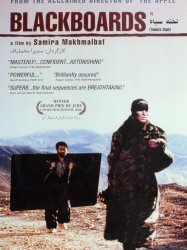
Blackboards (2000)
, 1h25Directed by Samira Makhmalbaf
Origin Iran
Genres Drama, War, Comedy, Action, Horror, Historical, Romance
Themes Films about education
Actors Bahman Ghobadi, Behnaz Jafari
À la suite d'un bombardement au Kurdistan iranien, des instituteurs errent de village en village à la recherche d'élèves.
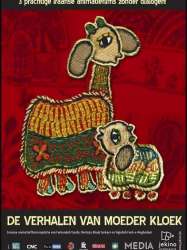
Shangoul & Mangoul (2000)
, 17minutesOrigin Iran
Genres Animation
Themes Films about animals, Film d'animation mettant en scène un animal, Wolves in film, Mise en scène d'un mammifère
En l'absence de la mère chèvre, le grand méchant loup pénètre dans la maison et tente de dévorer les chevreaux. Tous se défendent, mais il en avale deux. Les chevreaux sont finalement secourus par leur famille.

The Circle (2000)
, 1h25Directed by Jafar Panahi
Origin Iran
Genres Drama
Themes Feminist films, Pregnancy films, Political films
Actors Fereshteh Sadre Orafaiy
The film begins in a maternity ward of a hospital, where the mother of Solmaz Gholami is upset to learn that her daughter has just given birth to a girl, even though the ultrasound indicated that the baby would be a boy. Worrying that her in-laws will force their son to divorce her daughter, she tells another daughter to call her uncles.
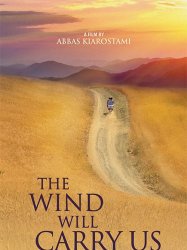
The Wind Will Carry Us (1999)
, 1h55Directed by Abbas Kiarostami
Origin Iran
Genres Drama
Themes Philosophie, Poésie, Vieillesse
Actors Bahman Ghobadi
Behzad, Keyvan, Ali and Jahan who are journalists but pretend to be production engineers arrive in a Kurdish village to document the locals' mourning rituals that anticipate the death of an old woman, but she remains alive. The main engineer is forced to slow down and appreciate the lifestyle of the village.
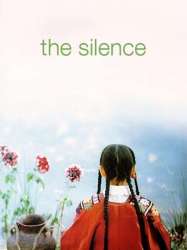
The Silence (1998)
, 1h14Directed by Mohsen Makhmalbaf
Origin Iran
Genres Drama, Musical
Themes Films about music and musicians, Musiques du monde, Musical films
Khorshid lives with his mom in a house near a river somewhere in Tajikistan. The landlord comes around every morning to ask for the rent. Khorshid has to provide the money or else they'll have to leave. His blindness has given him an amazing skill in tuning musical instruments which gets him a job at an instrument making workshop. But the problem is That Khorshid is mesmerized by sonorous music all the time; whenever he hears a great musician play, he loses track of time and place. For this, he always gets lost and gets to work late. How is he going to make a balance between his love of music and his task as a breadwinner.

The Apple (1998)
, 1h25Directed by Samira Makhmalbaf
Origin Iran
Genres Drama
Themes Mise en scène d'une plante
Two daughters are locked up by their parents; an unemployed man and his blind wife, for eleven years. Their neighbours call social workers to investigate the situation and the results lead the girls on a bittersweet path to the rest of the world.

Taste of Cherry (1997)
, 1h39Directed by Abbas Kiarostami
Origin Iran
Genres Drama
Themes Films about suicide, Transport films, Films about automobiles, Road movies
Actors Homayoun Ershadi, Homayoun Ershadi
Mr Badii (Homayon Ershadi), a middle-aged man, drives through Tehran looking for someone to do a job for him, and he offers a large amount of money in return. During his drives with prospective candidates, Badii reveals that he plans to kill himself and has already dug the grave. He needs someone to throw earth on his body, after his death. He does not discuss why he wants to commit suicide.

Leila (1996)
, 1h42Directed by Dariush Mehrjui
Origin Iran
Genres Drama, Romance
Actors Leila Hatami, Ali Mosaffa, Jamileh Sheykhi, Mohammad-Reza Sharifinia, Shaghayegh Farahani
Leila and Reza are a modern Iranian couple, content with their recent marriage. However, Leila learns that she is unable to conceive. Reza's mother insists that he, as the only son, must have children ("everything goes to the son"), despite Reza's insistence that he does not want children, and suggests that he get a second wife. He adamantly refuses the idea; his mother champions it. Leila gets caught between the two worlds; elated at spending time with Reza one moment and torn apart by his nagging mother the next.

The Double Lottie (1995)
, 1h40Directed by Kiumars Pourahmad
Origin Iran
Genres Drama
Actors Khosrow Shakibai
Deux camarades de classe, Nargues et Nasrin, se rencontrent dans une fête d’école. Elles apprennent qu’elles sont, en fait, des jumelles. Leur père compositeur s’est séparé de leur mère tailleur sans leur dire un mot de tout ça. Une des deux fillettes vivait avec leur mère et l’autre avec leur père.
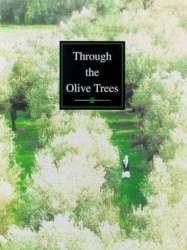
Through the Olive Trees (1994)
, 1h43Directed by Abbas Kiarostami
Origin Iran
Genres Drama, Comedy-drama
Themes Films about films, Philosophie
Actors Mohammad-Ali Keshavarz, Hossein Jafarian, Jafar Panahi, Abbas Kiarostami
Hossein Rezai plays a local stonemason-turned-actor. Outside the set of a film in which he is acting, he makes a marriage proposal to his leading lady, a student named Tahereh, who was orphaned by an earthquake. Because he is poor and illiterate, the girl's family finds his offer insulting; the girl avoids him as a result. She continues evading him even when they are filming, as she seems to have trouble grasping the difference between her role in the film and her real-life self. The fictional couple takes part in what would be the filming of Life, and Nothing More....

Once Upon a Time, Cinema (1992)
, 1h30Directed by Mohsen Makhmalbaf
Origin Iran
Genres Comedy, Fantasy, Historical
Actors Ezatollah Entezami, Akbar Abdi, Mohammad-Ali Keshavarz, Mehdi Hashemi, Fatemah Motamed-Aria, Mahaya Petrosian
The film follows a character known as The Cinematographer (Mehdi Hashemi), who is looking for someone called Atieh (Future). As he calls out to her, he is magically transported back in time from the early twentieth century to the reign of Naser al-Din Shah in 19th century Iran. Captured by the Shah's guards, he shows films from the (future) history of Iranian cinema to the Shah (Ezzatolah Entezami). The Shah is entranced and eagerly shows his family the apparently magical medium.

Travelers (1992)
, 1h38Directed by Bahram Beizai
Origin Iran
Genres Drama
Actors Fatemah Motamed-Aria, Homa Rousta, Jamileh Sheykhi, Atila Pesyani, Karim Akbari Mobarakeh
Mahtab, la sœur de Mahrokh, est en route avec son mari et ses deux enfants de la région au bord de la mer Caspienne vers Téhéran pour rapporter le miroir précieux, héritage familial de la nouvelle mariée, à la noce. Sur la route, une villageoise les rejoint dans leur voyage.
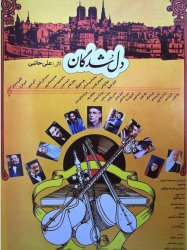
The Love-Stricken (1992)
, 1h31Directed by Ali Hatami
Origin Iran
Genres Drama, Historical, Musical
Themes Films about music and musicians, Musical films
Actors Amin Tarokh, Mohammad-Ali Keshavarz, Akbar Abdi, Jamshid Hashempour, Shahla Riahi, Saeed Poursamimi
His imperial majesty Ahmad Shah Qajar asks a group of Iranian musicians, unaffiliated with the royal court, to record a sample of Persian Classical Music on newly invented gramophone at the Conservatoire de Paris. A group of best musicians gather under the direction of Maestro Delnavaz. A singer named Taher (Amin Tarokh) also accompanies them to the journey to Paris.
 Connection
Connection